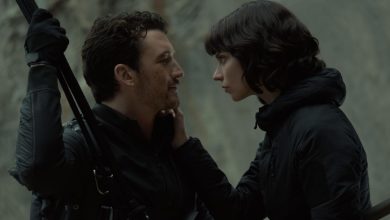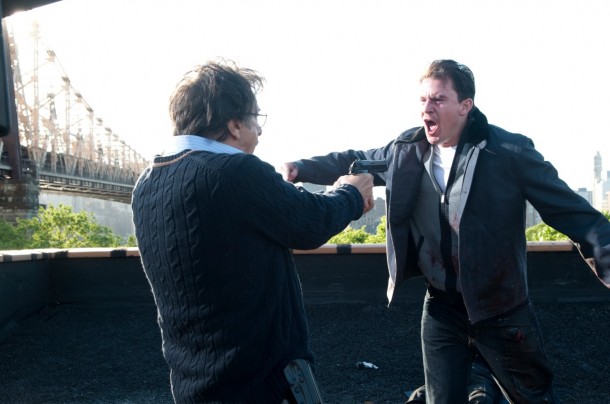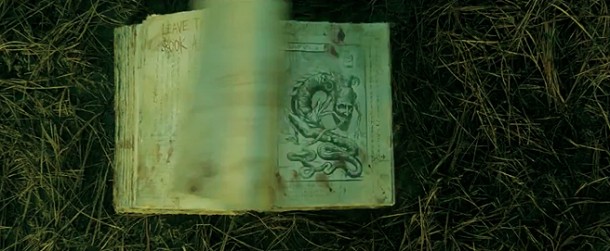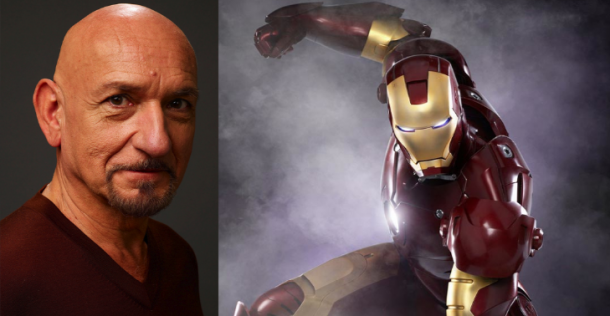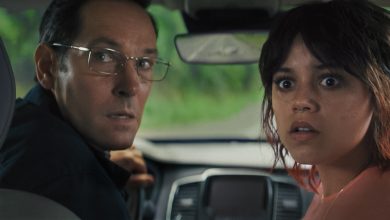Puppets, Penguins, and Panych with Matthew Kowalchuk
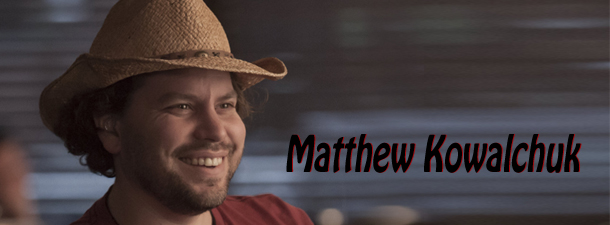
Matthew Kowalchuk’s feature film directorial debut Lawrence & Holloman has fast become a favorite with audiences worldwide. From Vancouver, to Shanghai, to Cannes, to Perth this dark comedy has taken the world by storm. After scooping up awards all across Canada, Matthew and 108 Media Corp will be bringing Lawrence & Holloman to the U.S. for a theatrical release this spring (international audiences stay tuned). We caught up with Matthew to discuss directing, writing, festivals and whether he is a Lawrence or a Holloman.
MV: Welcome to Movie Vine, Matthew. You are in a pretty unique position right now, with two award-winning films playing at festivals around the world. A new short film called Bedbugs: A Musical Love Story, and of course your first feature, Lawrence & Holloman which recently played here at the Shanghai Film Festival. What has this experience been like for you so far?
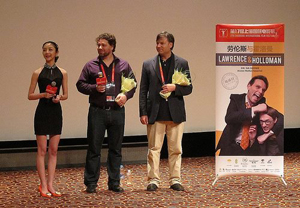
Matthew: It has been amazing and yet humbling at the same time. I’ve now been to many festivals, from very large ones to extremely small, and the sum of that experience is a great sort of balance that always seems to exist. I’ve been treated very well, and I’m grateful for that. I’ve also been humbled by all of the other incredible films and filmmakers out there. Shanghai is a great example. First, thanks to the festival, and the financial support of Telefilm Canada, it was an honour to be able to attend. We were absolutely treated like kings during our visit. They actually had bodyguards helping us through the crowd after our screening. That’s an experience I won’t soon forget! When it’s finished though, you suddenly realize that there are 800+ films playing in the most populated city in the world, and, you know, Natalie Portman is holding a press conference in the next room over. And, though just ten minutes ago, it felt like you won the Oscar for Most Important Person Who Ever Made a Movie, now you’re kind of forgotten. That’s not a bad thing. It’s a not so subtle reminder of why we do this in the first place. A filmmaker sets out to tell a story and we are truly honoured when we have the gift of an appreciative and enthusiastic audience. When we made Lawrence & Holloman, that was the prize, you know? That we made it, period. What a great feeling, to accomplish that. We never expected awards. We didn’t know for sure that it would have this universal appeal that it seems to have. So I take it all in stride. I enjoy the ‘hurrah’ moments, and accept the pats on the back — though it’s been strange getting used to accepting awards! The whole experience of festivals is at once exhilarating, inspiring, a bit unreal — and all incredibly fleeting. At the end of the day, every festival, every audience that sees the film, is a reminder of how lucky I am to be able to make movies — to tell stories — for a living.
MV: Shanghai can be a bit overwhelming at first, but it is such a great city. I moved here from Los Angeles right about the same time as the festival so I missed it. I’m looking forward to attending next year. Have your films ever played at the same festival?
Matthew: Not at the same time, I’m still waiting for that to happen. But they’ve played a couple of the same festivals, one year apart. One thing that keeps on happening is that they will play on the same day in different parts of the world — there was one day that we had three total screenings happening. In St. Petersburg, Russia; Transylvania, Romania; and Tacoma, Washington. That was a bizarre feeling. I mean, I come from a live theatre background originally, and in that world you only get one audience at a time. So to be several places at once is just a bit mind-blowing to me.
MV: That would be such a bizarre feeling. Not only are your films playing all over the world, but they are also winning all sorts of awards. Congratulations on your most recent wins with both the Canadian Short Film award at EIFF (Edmonton International Film Festival) and the Best Actress award at the Vancouver Short Film Festival for Bedbugs: A Musical Love Story.
Matthew: Thanks, Jan. And thanks for taking the time to watch all these different films I’ve made – the attention is very flattering!
MV: I have really enjoyed watching them. You have found great success in showcasing your films at festivals. Would you mind sharing a little about the importance of festivals in today’s filmmaking world?
Matthew: Well, you hear a lot these days about films being easier to make. I wouldn’t say that exactly – making a film is never easy – but the fact is more people than ever are making movies, because the tools are now so accessible. With so many films out there now, as opposed to even, say, eight years ago when I made my first short film, it’s a real challenge to find an audience. And so, bottom line, festivals help by bringing in an audience that is genuinely interested in seeing your work. When I travel with a film, I’m always amazed that I can show up and often see a full house laughing at my movie – but that’s what’s so great. Whether you’re in Shanghai or South Haven, Michigan, film festival audiences are excited to see what you’ve brought for them. Beyond that, some of the bigger festivals are obviously better for industry networking, which at the very least can help you build relationships and therefore your career.
MV: That’s so true. Let’s start with Bedbugs: A Musical Love Story. What a fun short about love, loss and finding oneself. What first caught your attention with the script?
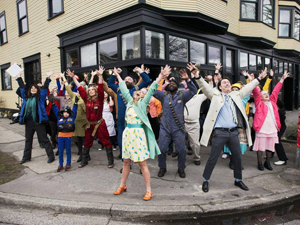
Matthew: I had crossed paths with (writer and star of Bedbugs) Shauna Johannesen before in a writers workshop and I was a big fan of her work. When she and her husband James Danderfer, who composed the music, showed it to me at first, it was at pitch stage only, and they just wanted my opinion. Then they pitched it for the Crazy 8s competition, which is very competitive – 150+ applicants and in the end, 6 films get made. The deal is they are made from start to finish in 8 days (though, we were able to prep for it, of course), with a micro-budget and a whole lot of sponsorship help. So, when they were selected to the top 40, that’s when they asked me if I would like to direct. And interestingly, there was no script yet, but the story was definitely intriguing. And knowing Shauna as a writer and actor, I knew she’d be able to create something special, something with a lot of heart. The only stipulation I had before signing on was that I would do it if we could change the ‘guy in the bedbug costume’ from the initial pitch, to puppets!
MV: The bedbugs seem like a fun group to work with. How did you approach working with the puppets … I mean bug actors?
Matthew: I was very excited to be working with puppets for the first time. I’ve always loved The Muppet Movie, and other Muppet creations – the idea of these puppets interacting with people, for some reason has always made me smile and laugh. Part of the magic of that is that it’s not just for kids, you know? That’s part of the expectation, even when you watch something like Sesame Street as a grown up, you know they’re going to have guest stars that you recognize and pop culture references that the younger audience won’t care about. The Bedbugs were created by Mauri Bernstein, who is an accomplished puppeteer as well. The fact that we had no budget and very little time was a blessing in disguise. On set, there was a lot of playing around. We had, I think, five puppeteers, and one “handler/wrangler”. Now, puppeteers are a special breed. They basically always seem to be in character – they were hilarious and fun to work with. If you think you’ve seen everything on set, you should see a 1st AD ordering a puppet around sometime!
MV: That’s funny! Since you were working with such a huge time constraint, did you find that your background in theatre helped bring to life everything that Shauna created?
Matthew: Yes, definitely. I haven’t worked on a lot of musicals, but I knew the premise would sink or swim based on the quality of the songs, so we put a lot of work into them. It helped that the music and lyrics were already incredible, of course. I think the biggest impact my background had was in casting. I have a network of contacts that includes a lot of musical theatre trained actors. There is usually a pretty big divide between acting on stage and acting for the camera, so the challenge was to find the right people and film them in such a way that you know you’re watching a big musical, but you never feel like you’re very clearly watching a film and not a filmed stage play. We also brought in a choreographer, Laura Ross, who is actually a close friend from theatre school. Her work really elevated the piece – she even gave the bedbug puppets some brilliant moves of their own!
MV: This is the first film you have directed without being part of the writing process. What are some of the challenges you faced directing another writer’s story versus your own?
Matthew: I found it very freeing, actually. When working with a script that I’ve written, I am in a sense directing while I’m writing it. I’m putting direction into the script because I know that I’m the one who will be doing that. No interpretation needed. But what I truly love about film is the collaboration. I’ve always felt that the point of having collaborators is for them to be way better at their jobs than I could ever be. I go in with that assumption, that you the writer, or you the cinematographer, or whatever, are better at your job than me. I respect your work and we’ll work together, but I’m very gentle in finding the best way to work together. Shauna’s writing was so good, that the main challenge was really to make sure I wasn’t misinterpreting her intention. I worked closely with her, and we were in agreement about the direction it was heading, but in the end I value the fact that it is her story to tell, and so I ask myself what I can do to guide and support that before we go to camera. And of course, as a director, I begin to see things outside of the page that she may not and so I make suggestions along the way… which then get clearer and more persistent as we get closer to our shoot. When working with my own material, the opposite is happening. I get it, of course. I know what I’m after. So I have to question, does this make some sort of sense to others as well?
MV: In your short film Penguins (Are So Sensitive to My Needs) you use both live action and 2D animation. Would you mind walking us through the process having animation in a live action film?
Matthew: I look back on this and see how monumental the task was. I’m not an animator myself, and so I enlisted a crack team of animators to bring this vision to life. The original art I had worked on was hand drawn, that’s what I wanted to do. But a few factors made that an impossibility: the artist I was working with suddenly had a job at Sony Pictures working on stuff like the Smurfs, so she had no time for it. Also, the project was commissioned by a Vancouver organization called Kickstart Disability Arts and Culture (I’m extremely hard of hearing) and came with a deadline of only a few months. Not much time at all for this sort of project, but a challenge that I welcomed. So, in a nutshell, we had a team of about a dozen people animating for us, most of them just out of film school. One was working remotely from Brazil; another was in Korea for part of the time. It was really incredible that it worked. The lead animator, Ayla Radies, really pulled it all together, and put up with my best attempts to direct animated penguins – which is really, really hard, by the way. Then, she would get the different elements (backgrounds, characters, different scenes, etc.) from her team and put them together for me and producing partner and post-production genius Jonathan Martin. We would then manipulate the layers ourselves occasionally, and add some effects, things like a blizzard, on top of the already created animation. During all this, we had edited the full piece and had timed out the animated sequences, so it was a matter of tweaking them separately and inserting them into the film. Another big part of it was voicing the penguins. We had a great voice over session once the scenes were locked, and added music, too. There are a couple of scenes in which our lead actor, Daniel Arnold, and Puff the Penguin interact, and to me those are the most fun moments. The funny thing is, compared to all the layers of animation and working with a dozen animators, they were relatively easy!
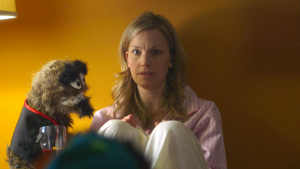
MV: Who is tougher to work with actors, penguins or bedbugs?
Matthew: I honestly have a great time with them all, but I’m gonna go with Penguins here.
MV: Lawrence & Holloman is your adaptation of the Morris Panych play of the same name. What first attracted you to the play, and when did the idea spark to write it for the big screen?
Matthew: I’ve always been a big, big fan of Panych’s plays, and actually directed one of his plays early in my theatre career. I had seen a production of L&H probably ten years before, and remembered it well. But – and maybe this is odd – I had always read his plays before I had seen them produced. So I had so much respect for his writing, and a good sense of the material itself independent of other people’s interpretations. His stories tend to riff on existential themes. He goes to extremes, and Lawrence & Holloman may be his most extreme. It’s dark and funny, and at its heart is a story about friendship that we can connect with. These two guys, who are complete opposites in every way, somehow, some way, need each other in order to exist. The cosmic yin and yang, I guess. That concept appeals to me. And then the comedy, the potential for sheer physical comedy as a film, was immense. Fast forward a few years, and I’ve now had the experience of watching an audience in Shanghai, watching L&H with subtitles. And what a thrill to see how much they enjoyed it! I think, watching that screening, I noticed truly how physical it is, and how, even though so much of the comedy depends on wordplay, we’d really created a story with universal characters and a universal struggle.
Oh right, the question – what sparked it: The idea actually came from Daniel though (who co-wrote the screenplay and played Holloman). I approached him with the idea of doing the play together, with both of us acting in it. And somehow that got the wheels turning for him and he told me he thought it could be a great little indie film, one that we could probably accomplish on a super low budget. We envisioned it being a ‘shooting on weekends with friends’ sort of micro budget affair, that we’d complete over many months of shooting. Obviously, it became bigger than that, but that was our first thought. “It’s a two-hander, it’ll be easy!”
MV: It is amazing how humor can differ so drastically depending on language and culture. So much humor gets lost in translation, however physical comedy is a universal language. You mentioned earlier that when writing a script that you’re going to direct your process changes a bit. Is that true for Lawrence & Holloman as well?
Matthew: One thing you can do when you know the screenplay is yours to direct, is that you can sort of “pre-direct”, you know? Without even thinking about it, it becomes part of the screenplay. There is always some sort of direction in the writing, and usually the director has to interpret and do their best at bringing across, or occasionally improving upon, the writer’s intention. But in this case, Daniel and I would walk through a scene sometimes and as it came together, it was pretty clear how I would be directing it.
MV: I think Daniel brilliantly portrays Holloman. I completely believed him. The two of you have collaborated on a lot of projects. When co-writing this type of “buddy” film how did you split up the writing?
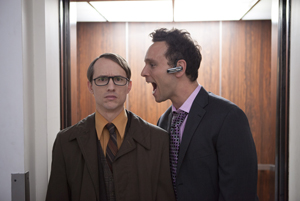
Matthew: It’s never the same, never truly balanced, so first let’s throw that notion out the window! There are times when it’s important to write together, in the same room. And once you know you’re on the same page together, it’s easier to work apart and share bits with each other. Typically, we’d each write a scene, then share it with the other for feedback notes, and then the re-writing would begin. For us it’s a really great way to work. We do have very different ways of writing, different sensibilities in many ways, but in the end, we enjoy a similar sense of humour, and we respect storytelling a lot. We don’t cut corners. The biggest thing though is kind of an intangible. It’s about trust and belief in one another. Maybe that’s my inner hippie talking, I don’t know. But what I mean is this: When I send a scene off to Daniel, the hope is that it’s just brilliant and maybe he’ll make it a little bit better still. But if he questions something about it or just flat out doesn’t like it, that tells us something. No matter how much I love it – and perhaps I’ll fight for it and perhaps not – I trust his instincts and therefore I’ll take a second look at it with his point of view in mind. And he does the same for me. That mutual respect, the fact that we listen to each other that way, is what gets us through the hard times, when maybe we are not on the same page. We are always investigating, always questioning our work, which is a hard way of working, but in my experience makes the end product better.
MV: Did you find that you had sort of a shorthand directing Daniel since you created the script together?
Matthew: At a certain point, we decided that he would play Holloman. This was never pre-determined, it was later in the writing process. Once that decision was made, he was basically writing the role for himself each time he touched it. So he got to know the character very well and when we got on set, yes, it was pretty automatic. He had in mind what he wanted to accomplish with the character, and I already knew and agreed with that, so my job was often to be a barometer of sorts, adjusting things slightly along the way. I wasn’t necessarily in love with all of his choices, but I gave him the benefit of the doubt and let him show me his idea on set. In most cases, he’d show me and I’d get it, it worked. He just knew the character so well. It required the same trust we have in each other when writing. If I then told him it wasn’t working, he’d trust me and make adjustments.
MV: In taking the story off the stage and into real life is the comedic pacing fairly parallel between stage and screen, or did you have to embellish/reduce the beats?
Matthew: It’s actually incredibly different. We kept so much of Panych’s witty dialogue, since obviously so much rides on that. And it’s freaking hilarious. But the fun of adapting this play is that, the way it’s written for the stage, simply wouldn’t do on film. So we had a challenge. The play is divided into 11 or 12 fairly long scenes. And in between each scene is an event that the audience will never see but only hear about. Lawrence’s downward spiral essentially, is told in the past tense. You’ll see him wearing a head bandage, for example, and learn within the scene that he got hit by a car. In the film version, we had the opportunity to – and really, we had to – show the actual event. So the whole dynamic of the film is different. And showing these things happen to Lawrence made the comedy come across that much darker, actually. So it served us well, because I think the worst thing we could have done with it is to water it down, lessen the impact of these horrible misfortunes that befall Lawrence.
MV: That’s so true. Theatre creates an environment where the audience has to use their imagination, but with film anything goes. He can actually get hit by the car. What were some of the most enjoyable aspects you were able to create on screen that would be impossible to add to the stage version?
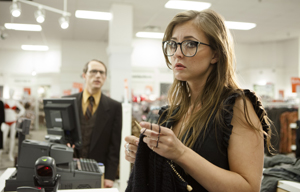
Matthew: I think just about every time we had the challenge of creating the scenes we could only imagine from the play. In the play, there would be a line like, “Since the accident—“; “Accident? Someone put sulfuric acid in your eye drops!!”, and we would go to work, thinking, ‘Ok, how did that happen exactly??’, and we’d create that scene. All of those – and there are quite a few – were fun. The other thing we did, because in the play there are literally only the two characters, is to create a believable world around them. Which meant creating new characters. In the play, Jill (Amy Matysio) is only mentioned as ‘the fiancé’. Zooey, played by Katharine Isabelle, doesn’t exist in the play at all. And Holloman’s mother is spoken of but all we know is that she’s in a home and Holloman says that he tries not to visit her. Writing these new characters was difficult, getting them on the same wavelength with the main characters took a long while to figure out. But when we eventually did, there was a great sense of fun and accomplishment. It really helped to make the screenplay feel like our own thing – we knew we weren`t simply going to be filming a play.
MV: With dark comedies there is a fine line between tragic comedy and just plain tragedy. How were you able to find the balance within all of the mishaps?
Matthew: Dark comic material is tricky. I questioned it a lot leading up to the shoot. Of course, one part of it is that as we made the film, I really didn’t think of it as a ‘dark comedy’; it just was one. The focus was on character and story, always. When I watch anything with the dark comedy tag, I’m put off by the ones that try too hard to show you just how dark it is. I mean, either the material is or isn’t, you know? And if it is, then all you can do is put the pedal to the metal, not hold back or pull punches. During prep I re-watched a movie that I absolutely hated the first time I watched it. It’s called Very Bad Things, which is Peter Berg’s first feature. There are some big names in it – Christian Slater was the marquee name at the time. But also in it were Cameron Diaz, Jeremy Piven, Daniel Stern, Jon Favreau. So it was easy for an audience to go in expecting something more mainstream. I had seen it years ago in the theatre and I wanted to know, what was it exactly that put me off? But a funny thing happened. Watching it again, I absolutely loved it! I couldn’t get enough of what Berg did with it. And I realized how much of dark comedy rests on expectation. If you go in expecting Hollywood fare with VBT or with L&H, you’re most likely going to be disappointed. One thing that Berg did, that I keyed in on in re-watch mode, was that he would play with that expectation within the scene. He would have a car going 60 miles an hour directly at a person, and you’re thinking, ‘there’s no way he’s going to let him get hit… is there?’. And of course, that’s the difference. We’ve learned to expect in most movies that the person always will avoid harm in that situation. But of course, the dark comedy version, the guy gets schmucked – and seriously harmed, since this isn’t Looney Tunes. We have a moment like that in L&H. Lawrence is holding his eye drops and we know there is acid in them. He should know, too, of course, but he’s too out of it to realize. As the audience, you have to be thinking there is no way he’s going to do that, there’s no way the filmmakers will let that happen. But the logical thing happens. He does it, crosses that line. It’s harsh and hard to take. But if you’re in the right frame of mind for it, then watching the scene is a completely exhilarating experience.
MV: Actors have to trust the director to reel them back in when necessary especially in physical comedies. Did you draw the line in rehearsal, or let Daniel and Ben (Cotton) loose during filming?

Matthew: I have a great amount of respect for the actors process. I come from acting, so of course I do. And I think it’s important not to hold them back in any way, which would include saying no to their suggestions along the way. That sounds a little ridiculous, I know, but I really do adhere to that philosophy to a fault. That said, in rehearsal is where we create our boundaries, the rules of this particular world, if you will. During filming, I don’t think you can ever go too far. I like to get a few different takes, and I hope that I do get a few that cross a line. Occasionally those come in handy and are actually used. The second elevator scene (which opens our trailer) was one such scene. It’s a bit too far, a bit unfocused, but in the end that’s what I love about it. I asked Ben to just go for it with the sexual innuendo and he did. It feels so strange and unpredictable that you can’t help but laugh. And of course you’re also laughing because it makes Holloman so uncomfortable.
MV: During filming Ben was injured in an accident off set. Did this end up playing into the story, or did you have to rewrite his injury into the script?
Matthew: Oh right, I totally forgot about that. This was especially interesting because Ben’s character was wearing a walking boot too. Problem is, it was the wrong foot! We debated over and over and finally decided that we could live with it for this one scene, on the wrong foot – I was prepared to let the gaffe potentially be noticed (but I was banking on the audience not noticing), for the sake of Ben’s safety. We were in re-shoots and the scene was on a large staircase, to make things worse. But then Ben insisted that he could handle it for a short while and went without his real walking boot briefly. The really ridiculous thing is that the scene didn’t make the final cut.
MV: Without giving too much away, what has been your favorite audience reaction to Lawrence & Holloman?
Matthew: Watching it with a Chinese audience, seeing how much they enjoyed it was a definite highlight. Another memorable experience was at a smaller festival in Michigan. Next door to us, screening at the same time, was a new Jason Ritter film, with him in attendance. And so of course, they filled up this 600 seat auditorium to see the special guest star, while we literally had maybe a dozen people – which I’m pretty sure included a couple of festival volunteers – in this little tiny screening room. But I have a great memory from it. Two of the people in the audience laughed harder at the movie than I’d heard before or since. They just loved every part of it, got everything. It was awesome.
MV: Sometimes less is more. I’ve been in empty theaters and have had a better experience belly laughing with the three other people than giggling with hundreds. I’m naturally a “happy-go-lucky everything is awesome” type of person so I guess that would make me somewhat of a “Lawrence”. Which type are you a “Lawrence” or a “Holloman”?
Matthew: I’ve always been a Lawrence, I think. I started doing improv in my teens and really learned how much saying ‘Yes’ could do for storytelling, and it just felt like a natural fit. In the movie business, I think you have to have a certain amount of Lawrence in you to survive. You have to believe deep in your heart that you are going to get your movie made. You have to be able to take people’s criticism and filter it in positive ways. It’s hard to hear that your screenplay isn’t quite ready yet, when you just want to be done. But all the naysayers can help push you forward instead of backward, if you let them.
MV: That leads perfectly into my last question, as a Lawrence, when directing are you affected by the environment when things don’t go as planned, or do you push through regardless and make the best of it?
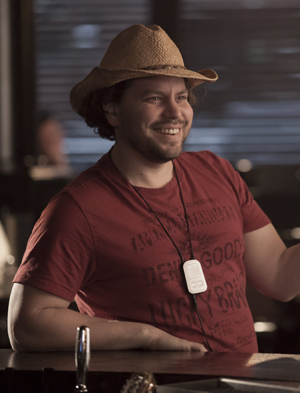
Matthew: There’s a certain amount that I like to go right – it’s hard to make the best of the wrong location, for example. But assuming all the pieces are in place to shoot a scene, then yes, push through the circumstances – bad weather or what have you. This is bound to happen if you choose to film anywhere remotely public, even if you‘ve got a street locked off. And sometimes an obstacle can end up being a gift, making a scene choice stronger than it would have been in the first place. The main thing I’ve learned is that if you have a sense of what you need from the scene, of what is most important to the story, then you make damn sure you get that. Rolling with it means that the scene may look different somehow than you’d intended, but you never let go of the core of it, the heart of why it is important to your story.
MV: Thank you so much for hanging out with Movie Vine today, Matthew. I really enjoyed Bedbugs: A Musical Love Story, Penguins (Are So Sensitive to My Needs) and of course Lawrence & Holloman. I can’t wait to see what you have in store for 2015.
Matthew: It was my pleasure, thanks so much for watching the films and, enjoying them!
*For more information on Matthew’s films check out his official site mattfilms.ca. Be sure to also follow Matthew on Twitter (@MattKowalchuk) for additional information on upcoming screenings, festival appearances, and the theatrical release dates for Lawrence & Holloman.
**Lawrence & Holloman photo credit: Katie Yu
